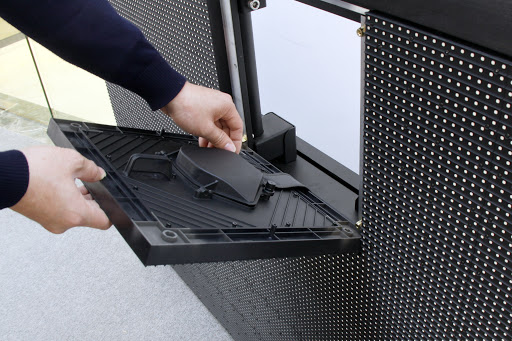Like traditional electronic products, we need to be careful about the operation and the maintenance of large screens of LED displays, in order to ensure it long service life. Part of the reason why problems increase in the use of large screens of LED displays is the inappropriate using habits. The following is a brief introduction to twelve major methods for maintaining LED large screens.

1. Storage temperature requirements: -40℃ ≤ ambient temperature ≤ 60℃. LED products should be stored with the temperature<30℃ and the humidity<60% after the packaging is opened.
2. Keep the humidity of the environment in which the LED large screen is used. Don't let anything with the nature of humidity enter your full-color LED screen. Energizing the large screen of full-color LED displays with high humidity will corrode the components, thus causing permanent damage.
3. Place rodenticide when necessary according to the environments in which the screen and the control part are placed to prevent the equipment from bites.
4. The power source should be stable and well-grounded. Don't use in harsh environments, especially that with thunder and lightning.
5. Don't turn off the LED display for a long time. In the environment with high humidity, if the screen has not been used for more than 3 days, turn on the screen by preheating first: preheat for 4-8 hours with 30%-50% of the luminance, and then increase it to the normal luminance (80%-100%); If the screen has not been used for more than 7 days, turn on the screen by preheating first: preheat for more than 12 hours with 30%-50% of the luminance, and then increase it to the normal luminance (80%-100%). It can eliminate moisture and avoid abnormality in using.
6. In the low-level protection, especially for outdoor full-color LED displays, dust will enter the equipment through vents, which will increasingly wear the equipment away and even damage the fan and other parts. Dust will fall on the surface of the internal control device, reducing the thermal conductivity and insulation performance. Dust will absorb the moisture in the air in humid weather and cause a short circuit. Dust can make printed circuit boards and electronic components moldy for a long time, resulting in decreased performance and equipment failure. Therefore, the cleaning of LED displays though seems to be simple, it is actually an important part of the maintenance. The surface of the large screen of LED displays can be scrubbed with alcohol. You can also use a brush or dust collector to dedust, but don't scrub directly with a wet cloth. If you plan to clean the surface of modules, scrub gently with a soft brush. It is forbidden to use any liquid substance to clean the surface of LED modules, or LED bulbs may be damaged; Scrub the screen as lightly as possible to minimize the possibility of damage.
7. Water, iron powder and other metals that are easy to conduct electricity are strictly prohibited in the screen. The large screen of LED displays should be placed in environments with few dusts as far as possible. Thick dust will affect the display and damage the circuit. Due to the fact that water flows in out of any reasons cut off the power immediately and contact the maintenance personnel. Don't use it before the panel inside the screen is dried off.
8. The sequence of turning on and off LED displays:
A: turn on the control computer to run it normally, and then turn on the large screen of LED displays.
B: turn off the screen, and then turn off the control computer.
9. Don't keep the screen full-luminous like all-white, all-red, all-green and all-blue for a long time, so as not to cause excessive current and heating of the power line, damage to the LED bulbs, thus affecting the service life of the screen. Don't disassemble or splice the screen at will.
10. It is recommended to rest the large screen of LED displays for more than 2 hours a day. During the plum rain season, use the screen at least once a week. Generally, turn on the screen at least once a month, lasting for no less than 2 hours.
11. Regularly check the large screen of LED displays to see if it works normally and if the circuit is damaged. If it doesn't work, replace it in time. If the circuit is damaged, repair or replace it in time. Place the main control computer and other related equipment in air-conditioned and dustless rooms, in order to maintain the ventilation, heat dissipation and stable operation of the computer. Non-professionals are forbidden to touch the internal circuit of the large screen of LED displays to avoid electric shock or damage to the circuit. If there is a problem, call professionals to check and repair.
12. Fastening. LED displays have high power consumption. After running for a period and being repeatedly turned on and off, terminals of the power source will become loose due to the change of heat. The contact of terminals will no longer be firm, forming virtual connections and even igniting the plastic parts nearby. Signal terminals will also be loose due to the change of temperature and humidity erosion, resulting in defect of contact and equipment failure. Therefore, it is necessary to tighten the connector of LED displays regularly. Use balanced and appropriate strength when adjusting fasteners, maintaining the inherent effectiveness.